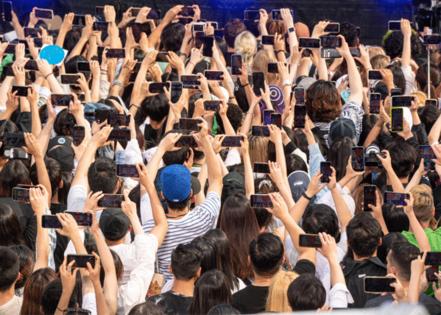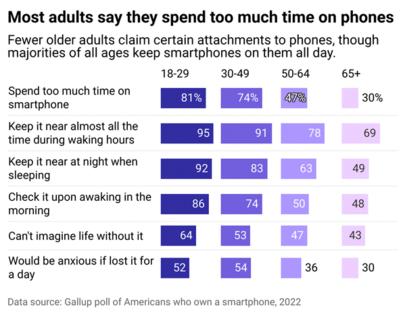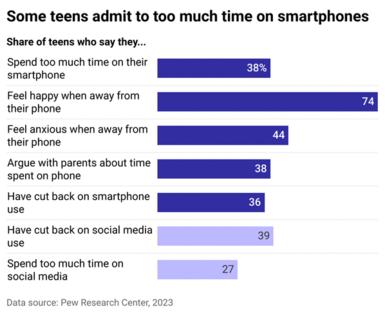Are Americans too attached to their phones? Here's what different generations say about their smartphone usage.
Published in Slideshow World
Subscribe
Are Americans too attached to their phones? Here's what different generations say about their smartphone usage.
As smartphones advance and social media options increase, more Americans across generations are finding solace in a digital playground.
People have become so attached to their mobile devices that many have admitted in polls that they can't imagine life without them. As different generations have different communication preferences, smartphone use inevitably varies across age groups. Spokeo analyzed generational trends in and perceptions of smartphone use amid public health concerns, using data from Pew Research Center and Gallup.
As of 2022, 58% of U.S. adults believe they spend too much time on their phones, up from 39% in 2015, according to the Gallup poll. Not only has the amount of people with phones increased since 2015, but all age groups were more likely to express this concern. Additionally, Pew reported that 38% of teens said they believe their phone use is excessive in a 2023 survey.
The U.S. Surgeon General, Dr. Vivek H. Murthy, has focused on teens and shared similar statistics. A May 2023 youth mental health advisory showed that out of the 95% of adolescents that use social media, over a third between 13 and 17 reported using it "almost constantly."
According to the same advisory, research shows that when adolescents spend more than three hours a day on social media, their risk for negative mental health effects such as anxiety and depression doubles.
Elevated social media usage has also affected teenagers' sleep quality and duration. Teen girls, especially, can experience body dissatisfaction, disordered eating behaviors, social comparison, and low self-esteem. More than half of teens have also reported seeing various hate-based content on social media platforms, according to the advisory.
Murthy has called for Congress to add warning labels to social media platforms, similar to the labels on cigarette packaging, The Washington Post reported. This effort is backed by 42 state attorneys general and co-led by the attorneys general of New York, California, Colorado, Kentucky, Mississippi, New Jersey, Oregon, and Tennessee.
Visit thestacker.com for similar lists and stories.
How adults use phones
Smartphones have become a one-stop shop for users of all ages and demographics to get many of their everyday tasks done, from socializing and checking emails to shopping and managing finances. Nearly two-thirds of Americans with smartphones believe their lives are better thanks to the devices, according to the Gallup poll.
The cohort that believes they use their phones too much, as of 2022, is users between 18 and 29, according to the Gallup poll. But it isn't just 20-somethings who admit to over-usage. Smartphone owners between ages 30 and 49 followed closely behind at 74%. Men and women shared similar usage beliefs, coming in at 56% and 60%, respectively, suggesting that gender has little to do with smartphone usage.
Device usage varies with age and, consequently, life circumstances. Based on the Gallup poll, the older the age range of people surveyed, the less they use their smartphones. However, in recent years, individuals above 50 have increased their usage while their younger counterparts continue to spend even more time online.
A 2023 Pew Research poll found that young individuals between 18 and 29 and middle-aged people between 30 and 49 were the most likely to have smartphones among all age groups. Nearly all respondents (97%) in those age groups had phones, compared to 90% in general. Some who lead especially busy lives even have more than one phone at their disposal.
Natasha Finister, 55, a childcare professional from Hawthorne, California, uses three mobile devices—two to run her business and one for personal use such as keeping up with friends on Facebook. Finister told Stacker she sees the positives and negatives of device use.
Because she runs an essential business, the two business phones act as backups that allow her to be reached at all times. She can leave one device in her place of work for her employees while she takes the other on errands. But it can also be a source of confusion and stress that feels in step with the frenetic pace of modern life. "Sometimes people will call me on all three [phones] or they'll call one, and I won't answer, then the other one will start ringing, so then it gets a little chaotic," Finister said.
Finister, who does not have a TV nor subscription to any cable services, noted her smartphone use went up around 10 years ago as she began using her device for Zoom meetings, tracking her heart rate and other health-related stats, and money-related applications such as Venmo, Zelle, and Cash App. Finister's smartphone use is intricately linked to her daily life, but she also understands its drawbacks. "I could imagine my life without my smartphone, if I didn't work," she said.
A May 2021 review of 84 research studies published in the journal Frontiers in Psychiatry detailed several adverse effects of smartphone use, including personality changes, decreased cognitive processing, and sleep disturbances. These challenges increasingly occur alongside mental health issues such as depression, anxiety, and OCD.
How teens use phones
While most teenagers today have smartphones, they express different sentiments between mobile device and social media use. Approximately 27% of U.S. teens have reported spending too much time on social media, while 64% said they spent the right amount of time, according to Pew Research.
Pew found teen girls are more likely than teen boys to report spending too much time on their smartphones or social media, and overall, the majority of teens have made no effort to limit their usage. However, 36% and 39% of teens say they have tried to curb their device and social media usage, respectively.
"Children are exposed to harmful content on social media, ranging from violent and sexual content, to bullying and harassment," Murthy said in a statement about the social media health advisory. He added, "for too many children, social media use is compromising their sleep and valuable in-person time with family and friends."
Finister has often seen this phenomenon as a childcare provider. More and more children are coming to her with developmental delays, especially in gross motor skills, as well as the need for specialists to help develop language skills. Despite the role of smartphones in her life, her childcare business operates a screen-free environment with no phones or televisions, as Finister assumes the children might be on screens at home for hours in some cases.
Even so, Finister finds it challenging to fight the tide of technology. Though Finister constantly reminded her children (now 21 and 28 years old) to be mindful of their smartphone use while growing up, she feels both of them are still too attached to their devices.
A July 2023 Gallup poll detailed that teens spent an average of 4.8 hours per day on various social media platforms. Older teens spent as much as 5.8 hours per day browsing social media.
Murthy added that he believed the U.S. is in the midst of a youth mental health crisis. "I am concerned that social media is an important driver of that crisis—one that we must urgently address," he said.
Murthy's call to have Congress require warning labels on social media platforms is inspired by the changes seen when a similar effort was put behind cigarettes. The warning labels propelled a 50-year smoking decline.
There are ways to curb one's personal use of smartphones, such as taking breaks during the day, deleting distracting apps, muting notifications, setting your device to grayscale, and finding alternate screen-free hobbies. But, according to the surgeon general, efforts to protect teens from the negative impact of devices and social media must be a group effort to maximize the benefits and minimize harm. Murthy urgently called for policymakers to create more robust safeguards and support digital literacy.
He also suggested that researchers develop tools to ensure online spaces are ideal for youth health, and technology companies should be protective of children's privacy and recognize the impact of their services on youth.
Many states have responded to Murthy's call, starting with Florida, which enacted a ban on phones in schools in July 2023. As of September 2024, 15 states have introduced or instituted restriction policies, according to Newsweek.
Additionally, in the advisory, Murthy encouraged parents to cultivate time for children to be tech-free and learn proper online etiquette while children do their part in being responsible online.
Murthy wrote in The New York Times, "There is no seatbelt for parents to click, no helmet to snap in place, no assurance that trusted experts have investigated and ensured that these platforms are safe for our kids. There are just parents and their children, trying to figure it out on their own, pitted against some of the best product engineers and most well-resourced companies in the world."
Story editing by Shanna Kelly. Additional editing by Carren Jao and Kelly Glass. Copy editing by Kristen Wegrzyn.
This story originally appeared on Spokeo and was produced and distributed in partnership with Stacker Studio.









Comments